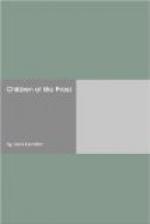“As I say, the meat in the forest became less and less. It be true, the white man’s gun is most excellent and kills a long way off; but of what worth the gun, when there is no meat to kill? When I was a boy on the Whitefish there was moose on every hill, and each year came the caribou uncountable. But now the hunter may take the trail ten days and not one moose gladden his eyes, while the caribou uncountable come no more at all. Small worth the gun, I say, killing a long way off, when there be nothing to kill.
“And I, Imber, pondered upon these things, watching the while the Whitefish, and the Pellys, and all the tribes of the land, perishing as perished the meat of the forest. Long I pondered. I talked with the shamans and the old men who were wise. I went apart that the sounds of the village might not disturb me, and I ate no meat so that my belly should not press upon me and make me slow of eye and ear. I sat long and sleepless in the forest, wide-eyed for the sign, my ears patient and keen for the word that was to come. And I wandered alone in the blackness of night to the river bank, where was wind-moaning and sobbing of water, and where I sought wisdom from the ghosts of old shamans in the trees and dead and gone.
“And in the end, as in a vision, came to me the short-haired and detestable dogs, and the way seemed plain. By the wisdom of Otsbaok, my father and a strong man, had the blood of our own wolf-dogs been kept clean, wherefore had they remained warm of hide and strong in the harness. So I returned to my village and made oration to the men. ‘This be a tribe, these white men,’ I said. ’A very large tribe, and doubtless there is no longer meat in their land, and they are come among us to make a new land for themselves. But they weaken us, and we die. They are a very hungry folk. Already has our meat gone from us, and it were well, if we would live, that we deal by them as we have dealt by their dogs.’
“And further oration I made, counselling fight. And the men of the Whitefish listened, and some said one thing, and some another, and some spoke of other and worthless things, and no man made brave talk of deeds and war. But while the young men were weak as water and afraid, I watched that the old men sat silent, and that in their eyes fires came and went. And later, when the village slept and no one knew, I drew the old men away into the forest and made more talk. And now we were agreed, and we remembered the good young days, and the free land, and the times of plenty, and the gladness and sunshine; and we called ourselves brothers, and swore great secrecy, and a mighty oath to cleanse the land of the evil breed that had come upon it. It be plain we were fools, but how were we to know, we old men of the Whitefish?
“And to hearten the others, I did the first deed. I kept guard upon the Yukon till the first canoe came down. In it were two white men, and when I stood upright upon the bank and raised my hand they changed their course and drove in to me. And as the man in the bow lifted his head, so, that he might know wherefore I wanted him, my arrow sang through the air straight to his throat, and he knew. The second man, who held paddle in the stern, had his rifle half to his shoulder when the first of my three spear-casts smote him.




